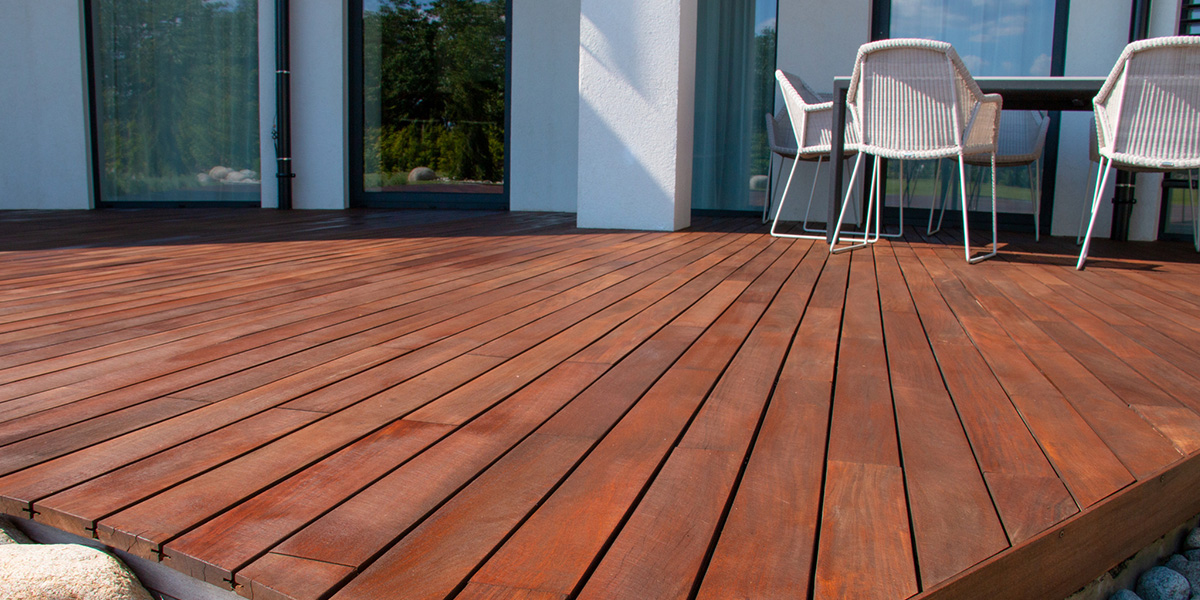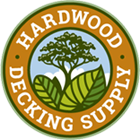5 Unique Features You Can Only Get with Tropical Hardwood Decks

There are plenty of materials to choose from when building a new deck, and while every material has its advantages, none has the unique appeal of tropical hardwoods. Tropical hardwoods are known for their dense structure and natural oils, which contribute to their longevity and low maintenance requirements. Available in various colors and grain patterns, they can add luxury and warmth to any outdoor space.
Read on to learn about tropical hardwood durability, their rich color and varied color, unique grain patterns, enhanced weather resistance, sustainable qualities, and how to experience the benefits yourself.
#1: Tropical hardwood decks are naturally durable and long-lasting
One of the most significant long-term benefits of choosing tropical hardwood for decking is its resistance to warping, cracking, and splintering — common issues in softer woods and some composite materials. The robust nature of tropical hardwood means it holds its shape and smooth texture over many years, even under frequent use. This durability adds to the deck’s aesthetic, maintains a neat and inviting appearance, and enhances safety by reducing the risk of splinters.
While composite decking may offer similar benefits, tropical hardwood is more resistant to fading and high temperatures. Other natural materials, such as pressure-treated cedar, aren’t as hard and may be more susceptible to physical damage, requiring more frequent staining and sealing to maintain their ideal condition.
The longevity of tropical hardwood decking is also a significant advantage. While initial costs might be higher than some other materials, the infrequency of replacement and low maintenance requirements make tropical hardwood a more cost-effective option over time.
#2: Tropical hardwoods offer rich and varied color palettes
Many wood types offer little variety in their appearance. However, tropical hardwoods are renowned for their stunning visual appeal, offering a range of rich, warm hues and intricate grain patterns. Some of the more visually striking types include:
- Ipe: Celebrated for its dark brown color that can range to olive or blackish-brown hues, Ipe often includes highlights of light or dark striping, which adds contrasts that make the material pop. Its ability to age beautifully into a silver-gray patina further enhances its visual charm.
- Batu: Also known as Red Balau, Batu is prized for its rich, vibrant mahogany color, which brings a warm and inviting ambiance to any decking project. Its consistent fine grain and smooth texture present a luxurious appearance that deepens into a striking, deeper red with age and exposure.
- South Pacific Redwood: Known for its captivating deep golden-red hues and intricate grain patterns, South Pacific Redwood, or Rimu, offers smooth texture and rich color variations.
Another benefit of tropical hardwood is its ability to maintain its color. The natural oils it possesses serve as built-in protectants that help retain its vibrant hues against the fading effects of sunlight and continuous exposure to the elements.
#3: Tropical hardwoods feature unique, distinctive grain patterns
Tropical hardwoods are highly prized for their aesthetic variety due to the distinguishing and diverse grain patterns each species offers. The diversity of grain patterns adds character to each species, making them easily identifiable and significantly different from other decking materials. The most distinctive grains are found in:
- Tigerwood: As its name suggests, Tigerwood boasts bold, dramatic grain patterns that mimic a tiger’s stripes. The sharp contrasts between its light golden background and dark brown to black streaks make it one of the most visually striking tropical hardwoods, ideal for making a statement in any setting.
- Cumaru: Also known as Brazilian Teak, Cumaru features a pronounced grain pattern with an array of golden-tan to reddish-brown hues. The interlocking grain of Cumaru reflects light differently throughout the day, giving the deck a dynamic appearance.
- Garapa: This wood type presents a lighter palette, with colors ranging from honey-yellow to warm golden brown. Garapa’s grain is fine to medium in texture, often straight but sometimes wavy, providing a bright and welcoming appearance that can lighten up darker spaces.
#4: Tropical hardwoods are super resistant to weather conditions
Certain characteristics found in tropical hardwoods make it resistant to most forms of weather:
- Their natural density makes them less porous, which means they absorb less moisture — an important factor in preventing expansion and contraction that can lead to warping and cracking.
- The natural oils in many tropical hardwoods provide built-in resistance to decay, insects, and fungal growth. This natural resistance is crucial for materials exposed to the elements and moisture associated with outdoor settings, especially wetter climates.
- Natural oils also offer protection from UV rays, helping the wood maintain its integrity when exposed to intense sunlight, which can bleach and degrade less resilient materials.
- Many tropical hardwoods have evolved in rainforests and have adapted to intense moisture and heavy rain, making them naturally suited for similar conditions in a home setting.
- Similarly, these woods are used to the fierce sun and high temperatures of tropical climates, allowing them to perform exceptionally well in hot, sunny settings without degrading.
#5: Decks made of tropical hardwood are eco-friendly and sustainable
The benefits of tropical hardwood go beyond durability and visual appeal. When responsibly sourced, it can be a sustainable and environmentally friendly option for those looking to upgrade their decks. Since it’s more durable than other woods, it lasts longer and must be replaced less often, reducing the materials needed to maintain your deck over time. Typically, it can be recycled or repurposed, further extending its lifecycle.
Tropical hardwood can also be sustainably sourced. When shopping for tropical hardwood, look for certifications like the Forest Stewardship Council (FSC), which plays an important role in sustainable sourcing. Organizations such as the FSC make sure that harvesting practices do not lead to deforestation, negatively impact the ecological balance, or harm the rights of indigenous communities. If you need clarification on whether a company adheres to sustainable practices, you can check its environmental policy.
Get affordable materials for your tropical hardwood deck from Hardwood Decking Supply
Ready to elevate your outdoor space with the unmatched beauty and durability of tropical hardwood decking? Take advantage of the opportunity to transform your backyard into a stunning, sustainable oasis. The Hardwood Decking supply team is here to guide you through selecting the perfect tropical hardwood to make your vision a reality. Contact us today or give us a call at 866-452-2573 to explore our extensive range of high-quality tropical hardwoods, and let us help you create a stunning deck built to last.
